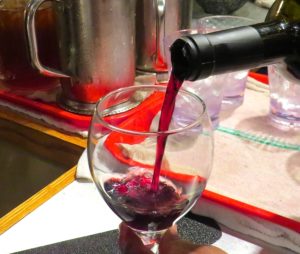There are heroes living among us, men and women who struggle and prevail every day with the demon of addiction. You may know one of these heroes; you may not. They do not especially broadcast their struggles; neither do they hide them entirely. They rely on equal parts inner strength and the support of others. There are rare individuals who can do it on their own, but we are, after all, social animals, and most of us rely on others in every aspect of our lives.
The traditional means of support for alcoholics are the AA meetings that take place every day of the week — sometimes twice a day — at a handful of places in town. (Of course, there are meetings in Truro, Wellfleet, and Eastham as well.)

It is this support that interests me. As one person said to me, “This town is great for getting into trouble, but it is also a great place for support.” The essence of the meetings, beyond the 12-step program, is “to find someone you want to be like.” When someone finally “gets sick and tired of being sick and tired” he or she reaches out in some way and finds an outstretched hand and is then “sponsored” to be in a group (or groups).
I was told that there are meetings with over 80 people attending, and even more in the summer. The meeting I attended recently was a lot smaller: there were 16 people, a dozen men and four women. It was a small room, not crowded but full, which contributed to the quiet intimacy. I immediately informed the group that I was there to record the dynamics of the meeting and would not violate the strictures of anonymity. They generously welcomed me. Alcoholics Anonymous, I was told, is “accepting but not promoting.” It can’t be given away: “You need to want it.”
One person said that when he began he was told, “Go to 90 meetings in 90 days.” He did. He doesn’t go very often anymore, but even after 30 years of sobriety, he is mindful that “I am closer to my next drink than to my last.” The group is there for him if he ever needs it. He can always call someone: that is a powerful thing.
No one outside the experience of recovery can fully understand it. It is heavy lifting. “Addiction fits tight as a glove,” sings Emmylou Harris. It is not easy to face yourself and realize that a change has to be made. Therein lies the heroism. It takes a while to “come out of the fog” and realize that there is a life out there that can make sense without alcohol.
“Not every day can be a winner, but things don’t baffle me the way they used to,” said one person.
The hour I spent in that room with those beautiful people was transforming. It was in many ways painful — especially for someone who does not relish sharing the details of his life with others. But there was so much eloquence in that room as each person spoke, so much rigorous and blunt honesty, and some tears.
“My name is X and I am an alcoholic.” The story followed. There was such a respectful attention in the room, such a total absence of judgment, such acceptance and safety. The sharing went around the room. There were many expressions of gratitude, to the group and to the program, to a sense of refuge, to a sense of a community of suffering souls. But they are doing something about that suffering, living through it, and winning — although some “are out and come back.” And that is OK, too. No judgment. One man said he is “recovering” (after decades), not “recovered.” Vulnerability was met in full measure by kindness.
I left that meeting and re-entered the normal crazy world. The sun was shining, but it seemed colder, and less safe. I immediately missed those brave souls in that cramped room. I want people to know that in our wonderful communities we have people striving to be their better selves, and they are doing it together. They are heroes, and they live among us. They give me hope.
